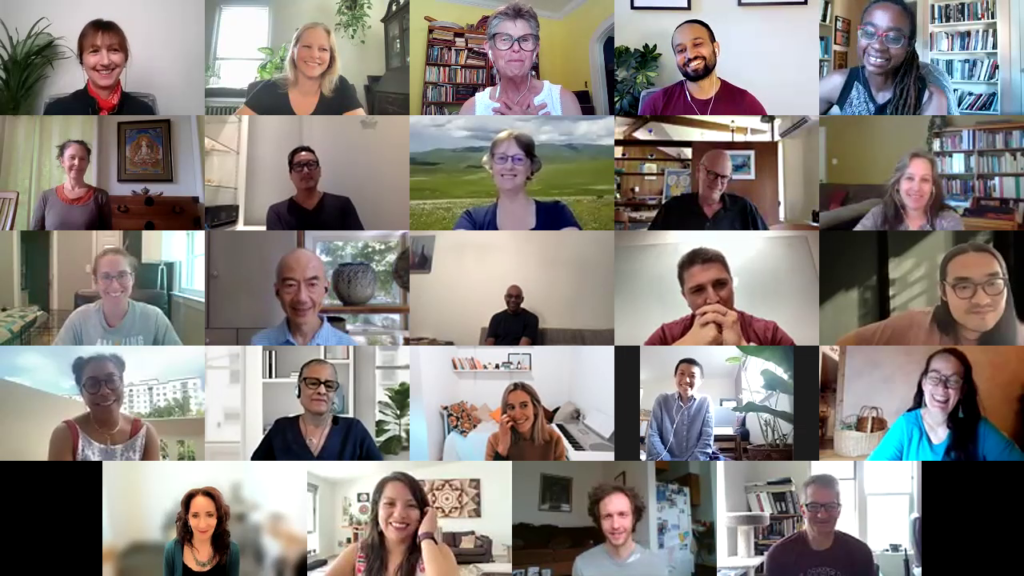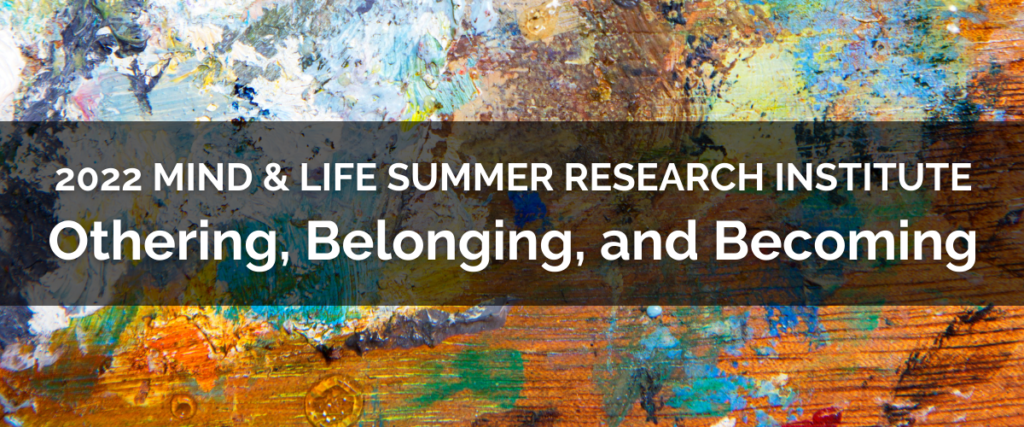
Against a backdrop of daunting polarization, violent conflicts, rising authoritarianism, and mounting climate chaos, Mind & Life’s 2022 Summer Research Institute (SRI) engaged participants in an audacious inquiry: What is the role of the human mind in creating today’s divisions, and how can our minds transform to create a more connected world?
From June 6-10, more than 300 researchers, contemplatives, and changemakers from 40+ countries convened online to explore the SRI 2022 theme of “Othering, Belonging, and Becoming.” Distinguished faculty spanned the disciplines of social psychology, philosophy, neuroscience, law, education, contemplation, activism, the arts, and more.
Over five days, participants came together—in plenaries, small groups, and contemplative sessions—to inquire into the root causes and potential solutions to the growing divides in our world.
Sessions bridged the promise and peril of our times. As Program Planning Committee member and law professor emeritus Angela Harris shared, “We’re living in a time when it seems like we’re in a race between catastrophe and transformation.” Indigenous scholar Yuria Celidwen put it this way, “It seems like a time of challenge and chaos that is also pregnant with possibilities.”
From a scientific perspective, we learned about the cascading processes that occur, largely unconsciously, when we socially exclude others, and the affinity humans feel for those who are like them. The challenge, according to social neuroscientist Lasana Harris, is nurturing awareness of these processes, along with moving beyond our socialization—and the “isms” that prevail in society—toward a sense of our fundamental interconnection.
Presenters laid bare the consequences of our disconnection from one another and the Earth, offering reasons for hope based on the choices we make. Philosopher of cognitive science Hanne De Jaegher reminded us, “Setting each other apart antagonistically is something we need to move beyond. This requires being aware of our differences and listening to one another.”
Evidence of what’s possible came from visionary leaders like activist Sulaiman Khatib, co-founder of Combatants for Peace in Palestine. Sulaiman shared its approach toward nonviolence and finding “a new story where both sides feel respected… and where all identities can live on the land with dignity and freedom.”
From social psychologist Pumla Gobodo-Madikizela in South Africa, we learned about the concept of umuntu, or personhood, and the factors that lead people to both lose and reclaim their fundamental humanity. sujatha baliga, a restorative justice facilitator in the US, spoke to the roots of restorative justice in ancient wisdom traditions and its use as a tool for healing harm and injustice in ways that endure and engage the wider community. Said sujatha:
“I know in my bones, and through my prayers, that we inter-are. There is no us-them,
me-you… I love the invitation to unconditionally welcome myself into the fullness
of my humanity so that I, too, can mean the things I’m seeking to transform.”
And law professor john a. powell introduced the concept of bridging through which it’s possible to facilitate recognition and compassionate engagement with those we perceive as “other.” As john explained: “Bridging doesn’t mean you agree with someone. It means you’re willing to pause and listen to them… You’re not listening to change them, but to see them.”
While the systems that perpetuate othering are deeply entrenched and highly resistant to change, presenters expressed hope in efforts to nurture relational understanding at the individual, community, and systems level—starting with how we educate children and young people. Developmental psychologist and education researcher Rob Roeser asked “How do we create experiences and environments, early and ongoing, where people are exposed to difference and without seeing it as worse?”
Another path forward lies in the stories we tell. Hanne shared: “Connected stories make us move in ways that are connected and allow us to develop; and the stories that are based on fear and rigidity stop us from connecting.” Yuria gave the example of the Mayan origin story that gives everything in the world a place and a purpose. She said “Indigenous cosmogonies start with how we are grateful to all different relatives in the world because they help our existence. That already starts us at a point of gratitude, of kindness, of relationship.”
The choices we make, the experiences we create, and the stories we tell are all part of building a greater collective sense of belonging. As john powell said, “What we do and how we live all matters.” Program Planning Committee member Ed Taylor advised that “we must hold one another accountable, but most importantly we must hold one another now.”
Summer Research Institute participants were invited to experience that sense of holding during contemplative practice sessions throughout the week. Mindful movement teacher kelley nicole palmer began the week by asking participants to explore ways to hold themselves tenderly, and dharma teacher Lama Willa Baker spoke to meditation as an act of intimacy, where we see ourselves as we are and realize our responsibility to enact care for one another on the path to belonging.
At the end of the five days together, SRI participants shared final reflections and joined together for a closing dance party. One participant reflected, “From the start of the program to the closing session, I felt as though I had come into a place where I felt truly seen, listened to, and welcomed. I have a renewed sense of hope and community from this beautiful gathering where so many people from across the globe could be together and share hope, space, and breathe.”
Deep gratitude to the SRI 2022 Program Planning Committee: Cliff Saron (co-chair), Ed Taylor (co-chair), Angela Harris, and Wendy Hasenkamp.


